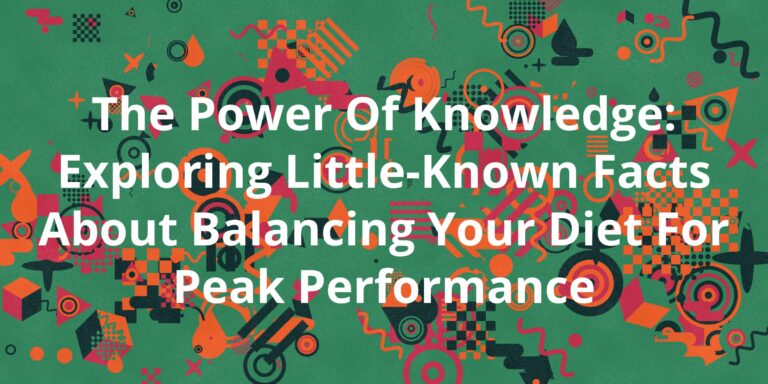Introduction
Nutrition is the foundation of health and wellness. It is the fuel that powers our bodies, minds, and spirits. Proper nutrition can help us maintain a healthy weight, reduce the risk of chronic diseases, improve our mental health, and enhance our overall quality of life. In this article, we will explore the power of nutrition and provide a comprehensive guide to balanced eating.
The Importance of Balanced Eating
Balanced eating is essential for optimal health and well-being. It involves consuming a variety of nutrient-dense foods from all the food groups in the right amounts. A balanced diet provides our bodies with the necessary nutrients, vitamins, minerals, and fiber to function properly. It also helps us maintain a healthy weight and reduces the risk of chronic diseases such as heart disease, diabetes, and cancer.
The Science Behind Balanced Eating
The science behind balanced eating is rooted in the concept of macronutrients and micronutrients. Macronutrients include carbohydrates, proteins, and fats, which are needed by our bodies to function properly. Micronutrients include vitamins and minerals, which are essential for maintaining optimal health.
Carbohydrates are the body’s primary source of energy. They come in two forms: simple and complex carbohydrates. Simple carbohydrates, such as sugars and refined grains, should be consumed in moderation as they can cause a rapid increase in blood sugar levels. Complex carbohydrates, on the other hand, are found in whole grains, fruits, vegetables, and legumes and provide sustained energy.
Proteins are essential for growth, repair, and maintenance of tissues. They come from animal and plant sources, including meat, poultry, fish, eggs, dairy products, beans, nuts, and seeds.
Fats are an important source of energy and help our bodies absorb certain vitamins and minerals. They come in two forms: saturated and unsaturated fats. Saturated fats, found in fatty meats, cheese, and processed foods, should be consumed in moderation as they can increase cholesterol levels. Unsaturated fats, found in avocados, nuts, seeds, and olive oil, are healthy and should be consumed in abundance.
Micronutrients include vitamins and minerals that are essential for maintaining optimal health. Vitamins A, C, and D are important for immune function, while calcium and vitamin D are essential for bone health. Iron is necessary for the production of red blood cells, while potassium helps regulate blood pressure.
The Benefits of Balanced Eating
Balanced eating has numerous benefits for our physical, mental, and emotional well-being. Here are some of the key benefits:
1. Maintaining a healthy weight: A balanced diet that includes plenty of fruits, vegetables, whole grains, and lean proteins can help us maintain a healthy weight.
2. Reducing the risk of chronic diseases: A diet rich in fruits, vegetables, whole grains, and lean proteins has been shown to reduce the risk of heart disease, diabetes, and certain types of cancer.
3. Improving mental health: Eating a balanced diet that includes plenty of omega-3 fatty acids, antioxidants, and B vitamins can help improve our mental health by reducing stress, anxiety, and depression.
4. Enhancing overall quality of life: A balanced diet can enhance our overall quality of life by improving our energy levels, mood, and cognitive function.
Creating a Balanced Diet Plan
Creating a balanced diet plan involves consuming a variety of nutrient-dense foods from all the food groups in the right amounts. Here are some tips for creating a balanced diet plan:
1. Eat plenty of fruits and vegetables: Fruits and vegetables provide essential vitamins, minerals, and fiber that our bodies need to function properly. Aim for at least 5 servings of fruits and vegetables per day.
2. Choose whole grains: Whole grains are a good source of complex carbohydrates and fiber. Choose whole-grain bread, pasta, rice, quinoa, and other grains instead of refined grains.
3. Include lean proteins: Lean proteins, including chicken, fish, beans, nuts, and seeds, are essential for growth, repair, and maintenance of tissues. Aim for at least 2-3 servings of lean protein per day.
4. Limit processed foods: Processed foods, including sugary drinks, snacks, and desserts, should be consumed in moderation as they can cause a rapid increase in blood sugar levels and contribute to weight gain.
5. Stay hydrated: Drinking plenty of water is essential for maintaining optimal health. Aim for at least 8 glasses of water per day.
Conclusion
Nutrition is the foundation of health and wellness. Eating a balanced diet that includes plenty of nutrient-dense foods from all the food groups in the right amounts can help us maintain a healthy weight, reduce the risk of chronic diseases, improve our mental health, and enhance our overall quality of life. By following the tips provided in this article, you can unleash the power of nutrition and create a balanced diet plan that will support your physical, mental, and emotional well-being.



